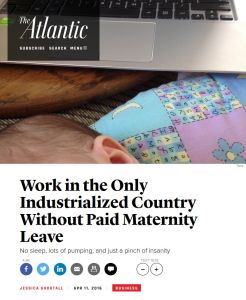Join getAbstract to access the summary!

Join getAbstract to access the summary!
Jessica Shortall
Work in the Only Industrialized Country Without Paid Maternity Leave
No Sleep, Lots of Pumping, and Just a Pinch of Insanity
The Atlantic, 2016
What's inside?
Some argue that paid maternity leave kills jobs, but does failing to provide it carry even higher costs?
Recommendation
In the United States, guaranteed, paid time off after giving birth is a rare exception, not the rule. Some critics claim that universal mandated leave would hurt the economy and harm small-business owners, but are these concerns valid? In this article, author Jessica Shortall follows the experience of one woman who returned to work just 20 days after giving birth. In the process of telling this mother’s story, Shortall offers a brief history of family leave in the United States, discusses the structures of such programs and explores factors worth considering in the family-leave debate. getAbstract recommends this article to business owners, CEOs, policy makers, economists and working parents.
Summary
About the Author
Jessica Shortall wrote Work. Pump. Repeat: The New Mom’s Guide to Breastfeeding and Going Back to Work.
















Comment on this summary